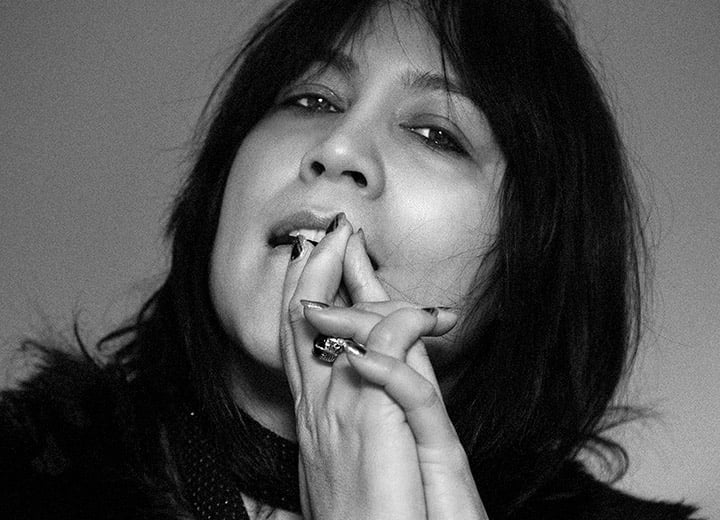Kate Ceberano opens her front door in layered swathes of clothing, protecting a vulnerable throat against the Melbourne chill. Halfway down the hall she’s bollock naked: head up, shoulders back and best foot forward in a massive oil painting. So goes the dance of art and life. As we settle into a cosy corner, her back against the heater and a spaniel called Banjo at her feet, she frames today’s portrait on her own terms. “I don’t believe in labelling of any kind,” she says. “It’s where the worst of pop psychology has left us: with words. When words fail, there’s music.”
Kate Ceberano is a household name in this country but it means different things in different houses, doesn’t it?
I think it’s always understood that it’s music first. I’ve been granted an entrée into those other areas simply because I sing. The other things that I’ve had to do are just what one does in Australia to survive. I don’t rate them good, bad or otherwise. It’s been an interesting game. It’s been without strategy.
TV talent shows have figured dramatically in your career. You won Search For a Star at 14; Dancing With the Stars in 2007. The X-Factor was a far less happy experience in 2005. On balance, are they good or evil?
I think those shows are good for people who need instant gratification, who need to have their confidence boosted by another person. In the end, if you’re relying on people to tell you if you’re good or not, that sets up a precedent of not having a lot of confidence. The beautiful thing about being an artist if you’re self-made is that you have the choice to change yourself.
What do you feel when you look back on your teenaged self in I’m Talking?
It was wonderful. It came on the back of this very cool instrumental system, Essendon Airport: very university-oriented; this fantastic subculture. The language of the group was amazing. It was a Pygmalion kind of situation for me, taking me out of bogan Balwyn, and every city we’d go to Ian Cox [saxophone] would take me to galleries and explain certain paintings. Barbara Hogarth [bass] was a graduate of literature so… it was a whole world opening to me.
As a young woman rising through the Eighties rock ranks, did you feel in control?
Yeah. I’m a dreamer. If I dream it and I pursue it, I kind of don’t give a fuck who’s in my way. I just get there. I’m blessed by this kind of dumbness. I only saw it the way my rose-coloured glasses saw it. The myopia of my youth, the actual literal myopia was a great thing. Because I was wild and not being able to see was freeing.
Michael Hutchence used to say the same thing.
Michael and I had many similarities. One year when he won the Best Male Countdown award and I won the Best Female… he scaled the wall of the Cosmopolitan Hotel and slept on my balcony.
Michael Hutchence stopped at your balcony? You must have had the window locked.
Maybe I did. I don’t think I had the art of seduction down. It wouldn’t have even occurred to me that he’d be interested, to be honest. But I do remember thinking, ‘We are in the same bubble. We’re about as stupid as each other.’
You were bullied by Chrissy Amphlett, and weathered a media beat-up with Kylie Minogue. Does showbiz pit women against each other?
It’s always been a badge of honour to have been picked on by Chrissy. What she basically said [later, in her book Pleasure and Pain] is that she felt threatened by the existence of someone who had studied her so carefully. I remember opening for her at 16 at The Venue and thinking, ‘God, I want to be her.’ So we find ourselves at this Brisbane Expo and I’m manifesting what I know is the same act! When I think about it, it’s kind of creepy. I was raised loving great singers and Chrissy was one of them. Before that it was Ella Fitzgerald, Billie Holiday, Aretha Franklin, Cilla Black, Dusty Springfield…
The thing with Kylie is that I just don’t rate her as a singer. So shoot me. It doesn’t mean I don’t marvel at the empire and the quality of her creation as a performing artist.
In your book, I’m Talking: My Life, My Words, My Music, you say, “When I think about the things that have driven my career, they’re as much about personal insecurity as talent.” Discuss.
Hmm. There are different kinds of insecurity. Steve Kilbey and Sean Sennett have been sending me lyrics for many months. I’m composing the music and singing it back to them. We only ever talk about music, which I’m very certain about. When it gets into other aspects of living… I’m still just making that up as I go along. Each day I arrive to stage, consumed by the adrenals, like Pavlov’s dog, everything turned on. I don’t know whether I’m running from a wolf or what it is but the nerves are right there. But get me in the song, and it just goes away.
What can you tell us about that project?
There’s this one lyric Steve wrote and I don’t know if he did it with intention but it just feels like me. “The horses in their bridled fury trot round an empty ring/The old ballet of yesterday has been replaced by the newest thing/Yes the net is gone and maybe now the swan can sing/For the girl on the highwire.” Fuck yeah. I’m the girl on the high wire. I’m without fear now.
—
This interview is part of our Living Legend series, as featured in issue #778 (available now). Photograph by Justine Walpole.








































